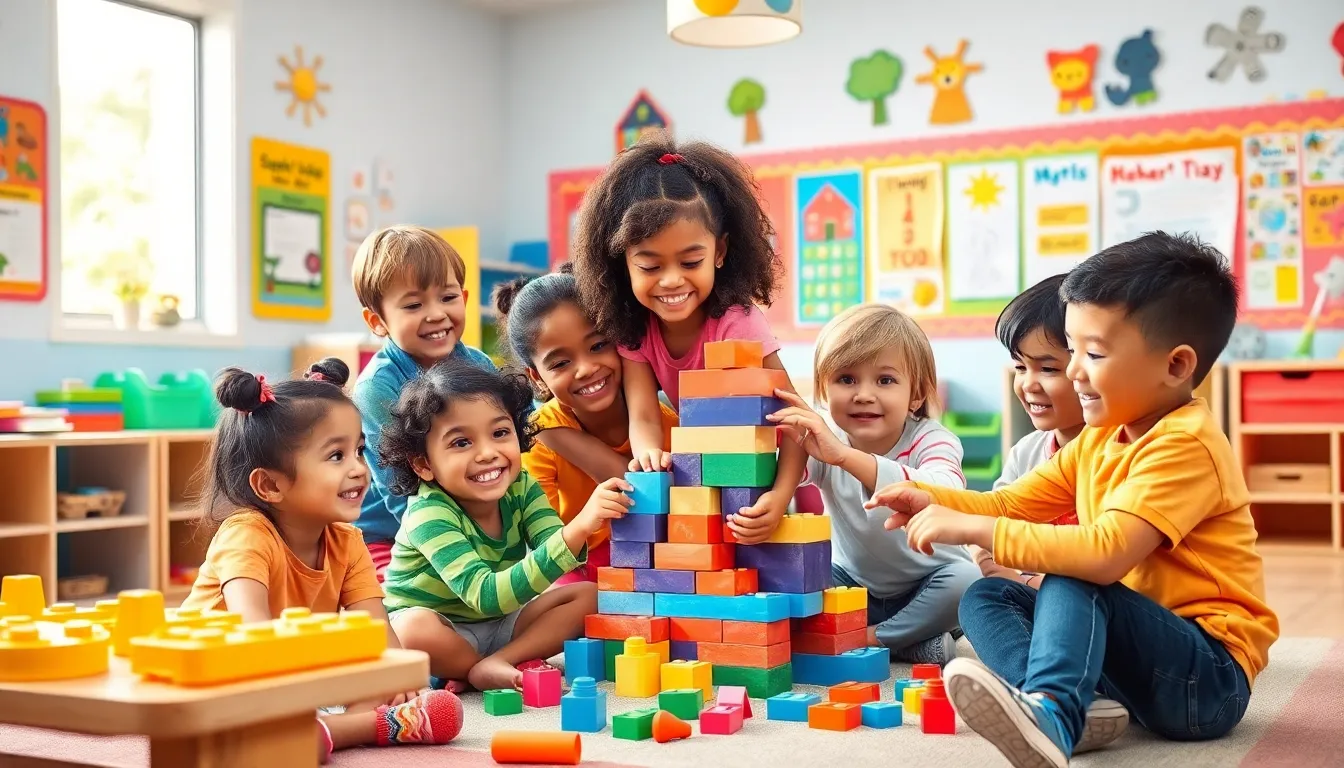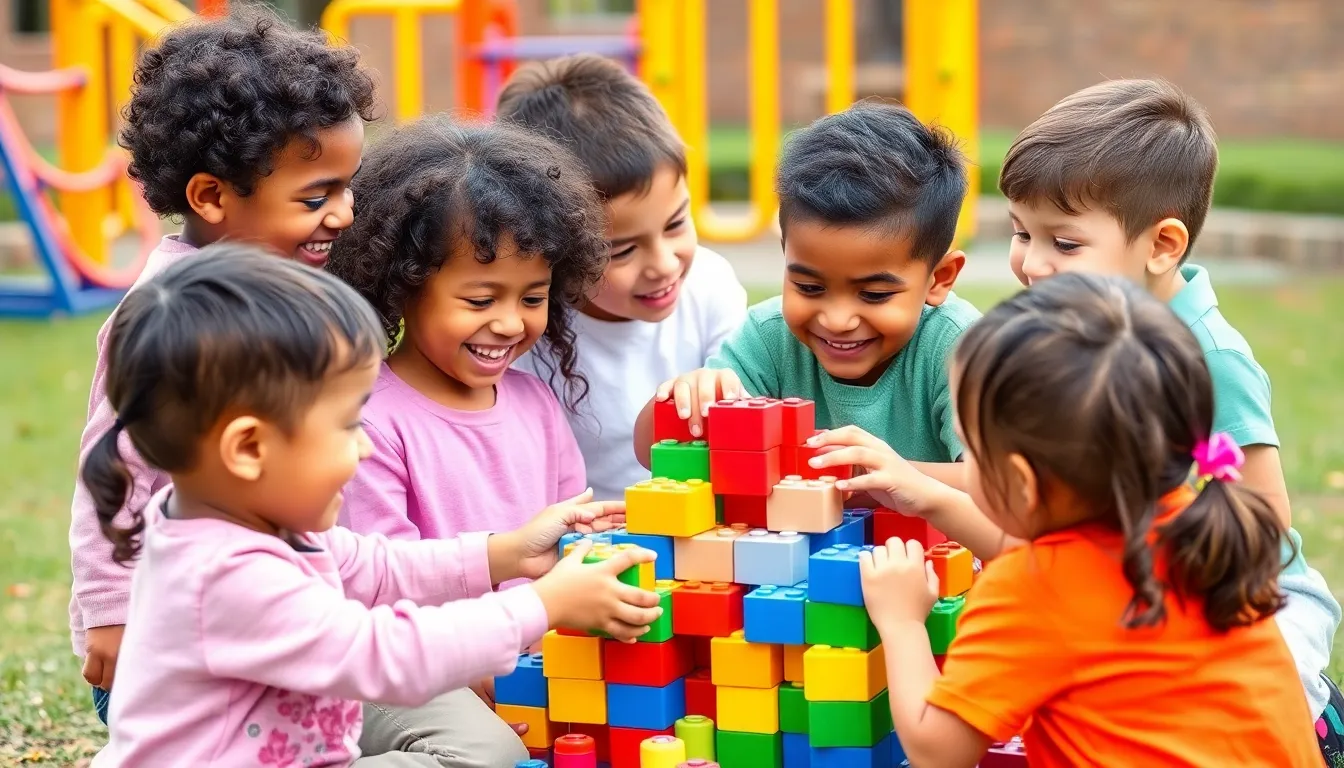Table of Contents
ToggleIn the colorful world of preschool, tiny humans are busy mastering the art of sharing crayons and negotiating snack time. Preschool peer interaction isn’t just about playdates and giggles; it’s a critical part of early childhood development. As kids navigate these social waters, they learn essential skills that set the stage for future friendships and teamwork.
Understanding Preschool Peer Interaction
During preschool, children engage in meaningful interactions with their peers, fostering essential social skills. These interactions play a vital role in shaping their ability to communicate, cooperate, and form relationships.
Definition and Importance
Peer interaction refers to the exchanges and relationships formed between children in a preschool setting. Such interactions provide opportunities for children to practice sharing, negotiation, and conflict resolution. Engaging with peers promotes emotional intelligence as children learn to recognize and respond to others’ feelings. Research shows that children with strong peer relationships experience improved self-esteem and higher levels of academic success later in life.
Developmental Stages
Preschool peer interaction unfolds through various developmental stages. Initially, children engage in parallel play, where they play side by side without direct interaction. As they progress, they shift to associative play, sharing materials and communicating with each other. Eventually, cooperative play emerges, characterized by collaborative efforts toward a common goal. Mastering these stages equips children with necessary skills for future social relationships. Recognizing these stages guides educators and caregivers in supporting and enhancing peer interactions effectively.
Types of Peer Interactions

Peer interactions in preschool consist of various types that shape social development. Understanding these types helps educators and caregivers facilitate positive experiences.
Cooperative Play
Cooperative play occurs when children actively engage with one another to achieve shared goals. They collaborate in building blocks or creating imaginary worlds, developing communication skills. Children learn to negotiate roles, share resources, and solve problems together, which fosters teamwork. Such interactions enhance their ability to empathize and understand others’ perspectives. Research shows that this type of play lays the foundation for strong relationships and effective conflict resolution in future interactions.
Competitive Play
Competitive play happens when children seek to outperform one another in games or challenges. In this context, children learn about winning and losing, which can impact their self-esteem. They participate in activities like races or team sports, providing opportunities to develop valuable skills. Through competition, children also gain insights into social dynamics and can build resilience. While this interaction type may occasionally lead to conflicts, it serves as a catalyst for learning about fairness and sportsmanship, crucial components of social interactions.
Factors Influencing Peer Interaction
Peer interaction in preschool hinges on several factors that significantly impact children’s social development. Understanding these elements helps foster positive experiences.
Social Skills Development
Social skills development plays a crucial role in enhancing peer interactions. Children learn to share, negotiate, and empathize during engaging play activities. Cooperation is vital for forming strong friendships. Skills like conflict resolution arise through navigating social dynamics among peers. They gain awareness of their actions and how these affect others. Successful social skills also boost self-esteem, empowering children to engage more actively with peers. Improved communication further facilitates relationships, allowing children to confidently express thoughts and feelings. Research shows that children who master these skills contribute to building supportive social networks.
Environmental Context
The environmental context shapes peer interactions significantly. An inclusive and supportive setting fosters collaboration and communication among children. Outdoor play areas encourage active engagement and teamwork. Classrooms designed for interaction promote group activities and socializing opportunities. Availability of diverse toys facilitates imaginative and cooperative play. Adults also influence interactions by guiding behavior and modeling communication skills. A positive atmosphere instills a sense of security, enabling children to connect with peers. Environments that embrace diversity promote acceptance and understanding, enriching children’s social experiences.
Benefits of Positive Peer Interaction
Positive peer interaction offers numerous advantages that significantly influence children’s development. These benefits encompass cognitive and emotional growth, which are essential during the preschool years.
Cognitive Benefits
Cognitive development thrives through positive peer interaction. Children often enhance problem-solving abilities while collaborating on tasks. Engaging with peers encourages critical thinking as they share ideas and learn from one another. Research indicates that discussions during play prompt children’s verbal skills and creativity. Shared activities, like building with blocks, develop spatial awareness and cognitive flexibility. Children gain perspectives that expand their understanding of the world, enabling them to think outside the box. Through these interactions, they learn to articulate thoughts and negotiate solutions, skills vital for later academic success.
Emotional Benefits
Emotional intelligence benefits significantly from peer interactions. Through meaningful exchanges, children cultivate empathy by recognizing feelings in others. They learn to express their emotions and interpret social cues during play, enhancing their emotional regulation. Positive interactions foster self-esteem as children experience acceptance and belonging within their peer group. They develop resilience through navigating conflicts and sharing experiences. Additionally, supportive peer relationships provide a safety net, encouraging children to take social risks. Socializing in inclusive environments enables children to appreciate diversity, contributing to a well-rounded emotional development.
Challenges in Peer Interaction
Children often face several challenges in peer interaction that can impact their social development. Two significant hurdles include social anxiety and aggression.
Social Anxiety
Social anxiety can hinder a child’s ability to engage with peers. Children experiencing this condition may feel nervous or fearful in social settings, affecting their willingness to join group activities. They often avoid interactions, which limits opportunities to develop communication skills. Signs of social anxiety include avoiding playdates or feeling uncomfortable during circle time. Early intervention, such as encouraging gradual exposure to social situations, can help children gain confidence in these settings.
Aggression and Conflict
Aggression and conflict frequently occur during peer interactions. Children might express frustration or anger through hitting or yelling, which disrupts play. Conflict often arises due to competition for resources, such as toys or attention. When children mismanage emotions, they may struggle to resolve disputes, impacting relationships. Teaching conflict resolution strategies, like taking deep breaths or using words to express feelings, promotes healthier interactions and equips children with essential social skills.
Preschool peer interaction plays a vital role in shaping children’s social and emotional development. As they engage with one another through various types of play, children cultivate essential skills that will serve them throughout their lives. The ability to communicate effectively, empathize, and resolve conflicts lays the groundwork for strong relationships and future success.
Creating supportive environments that encourage positive interactions is crucial for fostering these skills. By understanding the dynamics of peer relationships and the challenges that may arise, caregivers and educators can better facilitate enriching experiences. Ultimately, nurturing these connections not only enhances children’s self-esteem but also prepares them for the complexities of social interactions in the years to come.




